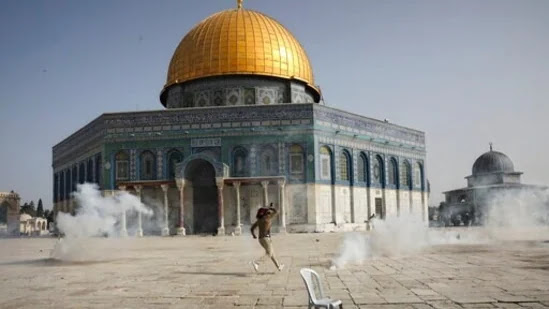''' '' WORLD'S -STUDENTS-
WOUNDS '' '''
TWENTY-SEVEN DAYS BEFORE THE FIRST ROCKET was fired from Gaza last week, a squad of Israeli police officers entered the Aqsa Mosque in Jerusalem, brushed the Palestinian attendants aside and strode across its vast limestone courtyard.
Then they cut the cables to the loudspeakers that broadcast payers to the faithful from four medieval minarets. It was the night of April 13, the first day of the Muslim holy month of Ramadan.
It was also Memorial Day in Israel, which honors those who have died fighting for the country. The Israeli president was delivering a speech at the Western Wall, a scared Jewish site below the mosque, and Israeli officials were concerned that the prayers would drown it out.
The incident was confirmed by six mosque officials, three of whom witnessed it; the Israeli police declined to comment. In the outside world, it barely registered.
But in hindsight, the police raid on the mosque, one of the holiest sites of Islam, was one of several actions that led, less than a month later, to the sudden resumption of war between Israel and Hamas, the militant group that rules the Gaza strip, and to the outbreak of civil unrest between Arabs and Jews across Israel itself.
''This was the turning point,'' said Sheikh Ekrima Sabri, the grand mufti of Jerusalem. ''Their actions would cause the situation to deteriorate.''
That deterioration has been far more devastating, far-reaching and fast paved than anyone imagined. It has led to the worst violence between between Israelis and Palestinians in years - not only in conflict with Hamas, which has killed over hundreds in Gaza and scores in Israel, but in a wave of mob attacks in mixed Arab-Jewish cities in Israel.
It has spawned unrest in cities across the occupied West Bank, where Israeli forces killed 11 Palestinians last Friday. And it has resulted in the firing of rockets toward Israel from a Palestinian refugee camp in Lebanon, prompted Jordanians to march toward Israel in protest and led Lebanese protesters to briefly cross their southern border with Israel.
The crisis came as Israeli government was struggling for its survival; as Hamas - which Israel views as a terrorist group - was seeking to expand its role within the Palestinian government; and as a new generation of Palestinians was asserting its own values and goals.
And it was an outgrowth of years of blockades and restrictions in Gaza, decades of occupation in the West Bank, and decades more of discrimination against Arabs within the state of Israel, said Avraham Burg, a former speaker of the Israeli Parliament and former chairman of the World Zionist Organization.
''All the enriched uranium was already in place,'' he said. ''But you needed a trigger. And the trigger was the Aqsa Mosque.''
It had been seven years since the last significant conflict with Hamas, and 16 since the last major Palestinian uprising, or intifida.
There was no major unrest in Jerusalem when President Donald J Trump recognized the city as Israel's capital and nominally moved the United States Embassy there.
There were no mass protests after four Arab countries normalized relations with Israel, abandoning a long held consensus that they would never do so until the Palestinian and Israeli conflict had been resolved.
''We have to wake up,'' said Ami Ayalon, a former director of the Israeli domestic intelligence agency, Shin Bet. ''We have to change the way we understand all his, starting with the concept that the status quo is stable.''
The loudspeaker incident was followed almost immediately by a police decision to close off a popular plaza outside the Damascus Gate, one of the main entrances to the Old City of Jerusalem. Young Palestinians / students typically gather there at night during Ramadan.
To Palestinian youth / students it was another insult. It led to protests, which led to nightly clashes between the police and young students trying to reclaim the place.
Most Palestinian residents of East Jerusalem, which Israel occupied during the 1967 Arab-Israel war and later annexed, are not Israeli citizens by choice, because many say applying for citizenship would confer legitimacy on an occupying power. So they cannot vote.
Shortly after 6 p.m. on Monday, the rocket fire from Gaza began.
The sadness and tragedy of this publishing is overwhelming, but continues. The World Students Society thanks author Patrick Kingsley, Rami Nazzal [Ramallah], West Bank, and Iyad Abuhuweila from Gaza City.
With respectful dedication to Leaders of the World, and then Students, Professors and Teachers of the entire Arab region. See Ya all prepare and register for Great Global Elections on The World Students Society : wssciw.blogspot.com and Twitter - !E-WOW! - The Ecosystem 2011 :
''' World - Weary '''
Good Night and God Bless

.png)


0 comments:
Post a Comment
Grace A Comment!